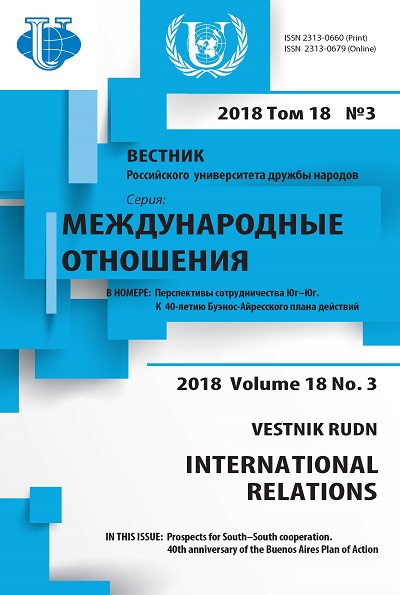ROLE OF GLOBAL SOUTH IN THE MULTIPLEX WORLD Interview with Professor AMITAV ACHARYA, UNESCO Chair in Transnational Challenges and Governance, Distinguished Professor at the School of International Service of American University
- Authors: - -
- Issue: Vol 18, No 3 (2018): Prospects for South—South Cooperation. 40th Anniversary of the Buenos Aires Plan of Action
- Pages: 701-705
- Section: SCIENTIFIC SCHOOL
- URL: https://journals.rudn.ru/international-relations/article/view/20113
- DOI: https://doi.org/10.22363/2313-0660-2018-18-3-701-705
- ID: 20113
Cite item
Full Text
Abstract
Amitav Acharya is the UNESCO Chair in Transnational Challenges and Governance and Distinguished Professor at the School of International Service, American University, Washington, DC. He is the first non-Western scholar to be elected (for 2014-15) as the President of the International Studies Association (ISA), the largest and most influential global network in international studies. Previously he was a Professor at York University, Toronto, and the Chair in Global Governance at the University of Bristol, U.K. He held the inaugural Nelson Mandela Visiting Professorship in International Relations at Rhodes University, South Africa in 2012-13 and the inaugural Boeing Company Chair in International Relations at the Schwarzman Scholars Program at Tsinghua University in 2016-18. He was a Fellow of Harvard’s Asia Center and John F. Kennedy School of Government, and was elected to the Christensen Fellowship at Oxford. His books include Constructing Global Order [Acharya 2018a]; The End of American World Order [Acharya 2018b]; Why Govern? Rethinking Demand and Progress in Global Governance [Acharya 2016]; The Making of Southeast Asia [Acharya 2013]; Whose Ideas Matter [Acharya 2009] and et. His essays have appeared in leading international affairs journals such as International Organization, International Security, International Studies Quarterly, Journal of Asian Studies, Foreign Affairs, Journal of Peace Research, International Affairs, and World Politics. He has received two Distinguished Scholar Awards from the ISA, one in 2015 from its Global South Caucus for his “contribution to non-Western IR theory and inclusion” in international studies, and another in 2018 from ISA’s International Organization Section that recognizes “scholars of exceptional merit... whose influence, intellectual works and mentorship will likely continue to impact the field for years to come”. In his interview, Professor A. Acharya talks about non-western IR theories, Global South issues and concept, contemporary international studies, multiplexity and the role of new institutions of global governance.
Keywords
References
- Acharya, A. (2009). Whose Ideas Matter: Agency and Power in Asian Regionalism. Ithaka, NY: Cornell University Press
- Acharya, A., Buzan, B. (2010). Ed. Non-Western International Relations Theory: Perspectives On and Beyond Asia. NY: Routledge
- Acharya, A. (2013). The Making of Southeast Asia: International Relations of a Region. Ithaka, NY: Cornell University Press
- Acharya, A. (Ed.). (2016). Why Govern: Rethinking Demand and Progress in Global Governance. Cambridge: Cambridge University Press
- Acharya, A. (2018a). Constructing Global Order: Agency and Change in World Politics. Cambridge: Cambridge University Press
- Acharya, A. (2018b). The End of American World Order. 2nd edition. Cambridge: Polity
- Acharya, A. (2018c). Imagining a Global IR Out of India. ORF Issue Brief. January 2018. № 224. P. 1-8. URL: https://www.orfonline.org/wp-content/uploads/2018/01/ORF_Issue_Brief_224_ GlobalIR_.pdf
- Grachikov, E.N. (2018). Review of the Book: Acharya, A. (2018). The End of the American World Order. Cambridge: Polity, 2nd edition, 224 p. Vestnik RUDN. International Relations, 18 (3), 706-715. doi: 10.22363/2313-0660-2018-18-3-706-715
Supplementary files










